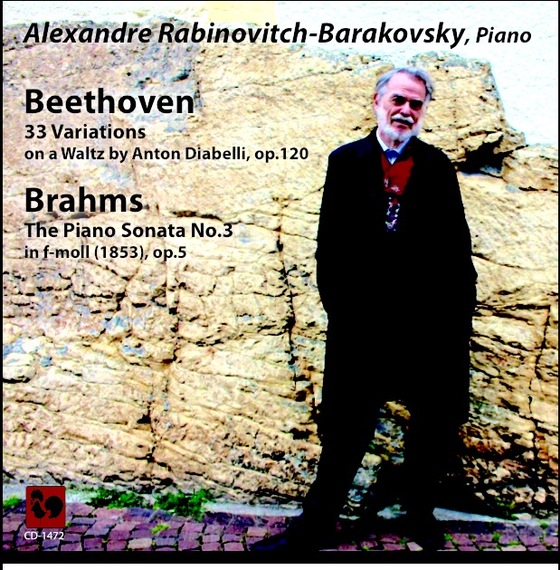How many recordings make you feel that one single performer practically owns a musical work? Schubert's waltzes 'belong' to Marcelle Meyer, Brahms's Intermezzi to Katchen, the Goldberg Variations to Gould, Der Rosenkavalier to Kleiber, Tristan to Furtwängler and Flagstad. From now on, you could add to the list Beethoven's Diabelli Variations as performed by Alexandre Rabinovitch-Barakovsky. As well as "his" Brahms 3rd Sonata.
Right from the start, the listener is filled with wonder: what one just heard can't be analysed or described. There is no notion of "analytical interpretation", of "respecting the score" or other jargon-filled stammerings of music critics fancying themselves fussy entomologists around a dissection table.
So how does one speak of a miracle when our reflexes prompt us toward pedantry, institutionalized as proof of scholarship? How to describe the playing of a performer who makes you discover works that you thought you "knew"? Respect of the tempo "indicated by the composer," you say? What Rabinovitch respects instead are the countless tempi, specific to each muscle making up the body of the Symphony for solo piano that is Brahms's 3rd Sonata. Here too, a "professional critic" would make a comparison with the narrative quality of Julius Katchen, the poetry of Radu Lupu.
Let's start by disregarding such ineptitudes - a "comparative listen" is no proof of culture but a sign of that very contemporary emptiness: a total lack of understanding of what constitutes a major work of art. Not a "stylistic achievement" (a sure sign of a rather minor execution) but, simply put, a living and therefore unique organism. As for the rest, an efficient supermarket app will do wonders for product comparison!
And as for the Diabellis, good luck if you want to "compare"! For starters, forget completely about "the music"; you knocked on the wrong door. Put on your mask instead if you want this door to open. You are entering a new genre, the masked ball-theatre. And this mask will quickly fall, revealing another one, then a third, fourth, fifth... Thirty-three masks, all of them "larger than life," will be your new faces since Beethoven's 33 Variations on a Theme by Diabelli in Rabinovitch's version are neither variations nor even transformations of a particularly insipid theme: they are masks towards the boundlessness of comedy, of tragedy also.
You like "contemporary music"? You could not have chosen more wisely. There is no piece written for piano that could be more contemporary, more theatrical, more enigmatic, crazier, freer, more "eccentric". The expression "timeless work" (another standard from "music-jargonland") takes on a whole new meaning with the Diabellis, which go from Bach (Variation no. 24), Mozart (Wolfie can be heard roaring with laughter over Rabinovitch's shoulder when he plays the 22nd), Brahms (the intermezzo in the 8th), to a premonition of Chopin in the Variation no. 31, a long lament that Rabinovitch plays with overwhelming sincerity. An endless "why" with no answer. The irrefutable proof that it was not Beethoven who was deaf, but God.
Let it end quickly, this 31st Variation, so that we can reach the conclusion of the final mask, which takes the form of a minuet, a reversal of all reversals, a calm and peaceful smile, an enigmatic but benevolent laugh, well informed by the whole odyssey just traveled.
"I was immortal during 33 variations, 33 times dead and 33 times revived, with 33 different faces. I can thus leave peacefully now. What can be more frightening in the next ball, "the" big one ? I will just have to avoid screaming uselessly at the oft-postponed meeting with the Creator of this whole mascarade. Remember, HE-IS-DEAF".
If I had the right to own only one piano CD it would be this one, my desert island would find itself populated with intelligence, meaning, benevolence...
Last but not least, this recording, which is live in every meaning of the word, a new release on the Gallo label, finds Alexander the Great on fantastic pianistic form: Alexandre Rabinovitch-Barakovsky is also a prodigious pianist !
